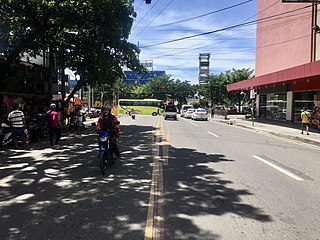Related Research Articles

Cebu City, officially the City of Cebu, is a 1st class highly urbanized city in the Central Visayas region of the Philippines. According to the 2020 census, it has a population of 964,169 people, making it the sixth-most populated city in the nation and the most populous in the Visayas and in Central Visayas Region.

Dumanjug, officially the Municipality of Dumanjug, is a 1st class municipality in the province of Cebu, Philippines. According to the 2020 census, it has a population of 57,823 people.

Vallacar Transit Incorporated (VTI) is a Philippine transportation service under the umbrella of the Yanson Group of Bus Companies (YGBC), serving as its flagship subsidiary.

The University of Cebu is a private, non-sectarian, coeducational basic and higher education institution in Cebu City, Philippines. It was founded in 1964 offering preschool, grade school, junior & senior high school, undergraduate degrees, and post-graduate degrees. It currently has six campuses.

Cebu Technological University, abbreviated as CTU and also known as Cebu Tech, is a public, non-sectarian, coeducational, state-funded higher education institution located in Cebu, Philippines. CTU was originally a part of the Philippine public high school system and traces its roots to the Manual Arts department of the Cebu Normal School, and was founded independently in 1911 as the Cebu Trade School. In 1928, the institution opened its own campus near the Port of Cebu, where its main campus still stands today.

The Cebu Bus Rapid Transit System is a mass transit system under construction in Cebu City, Philippines. It is expected to become the first operational bus rapid transit project in the Philippines. Only one line has been planned in detail so far, but scheme developers note the potential to develop a larger network comprising the adjacent cities of Lapu-Lapu, Mandaue, and Talisay, all of which, together with Cebu City, form part of the Cebu metropolitan area.
Local elections were held in Cebu on May 13, 2013, within the Philippine general election. Voters will select candidates for all local positions: a town mayor, vice mayor and town councilors, as well as members of the Sangguniang Panlalawigan, the vice-governor, governor and representatives for the six districts of Cebu. Incumbent governor Gwendolyn Garcia is barred for seeking another term because she is limited to three terms only.

JAM Liner Inc. is a bus company that serves direct routes from Manila to provinces of Laguna, Batangas and Quezon. Dennise Trajano serves as JAM Liner's President and CEO as well as Philtranco Services Enterprises, Incorporated.

The South Road Properties (SRP), also known as the South Reclamation Project, is a 300 ha reclamation area in Cebu City, Philippines. The area, which is reclaimed from Mactan Channel, is located off the coast of the southern district of Cebu City, near Barangays Mambaling, Inayawan, and Pasil. It spans from the shore of mainland Cebu to Kawit Point. An island-type reclaimed area, it is connected with mainland Cebu by the Cebu South Coastal Road and the Mambaling Access Road. Through the Cebu–Cordova Link Expressway, the SRP is also connected by land to Cordova and the island of Mactan.
Transportation within Cebu City is mainly land-based with most parts of the city accessible by road. There is no existing mass transit but construction is currently being undertaken on the Cebu Bus Rapid Transit System as well as an existing proposal for a Cebu Monorail, both of which will be crucial in solving the city's worsening traffic congestion, as existing transportation modes will soon become insufficient to move residents around the city if the local government fails to urgently implement infrastructure projects and measures to address the issue.

The Cebu Provincial Board is the Sangguniang Panlalawigan of the Philippine province of Cebu.

Cebu's 3rd congressional district is one of the seven congressional districts of the Philippines in the province of Cebu. It has been represented in the House of Representatives of the Philippines since 1916 and earlier in the Philippine Assembly from 1907 to 1916. The district consists of the city of Toledo and adjacent municipalities of Aloguinsan, Asturias, Balamban, Barili, Pinamungajan and Tuburan. It is currently represented in the 19th Congress by Pablo John Garcia of the National Unity Party (NUP) and One Cebu (1-Cebu).

F. Llamas Street is a national tertiary road in Cebu City, Cebu, Philippines. It commences at N. Bacalso Avenue in Barangay Basak San Nicolas, passes through the junction of Tres de Abril and E. Sabellano streets and ends at the junction of Katipunan Street in Barangay Tisa. It was formerly considered as a "national aid" city road under Executive Order No. 113 issued by President Ramon Magsaysay on May 2, 1955.
The Cebu North Bus Terminal (CNBT) is a bus station in Cebu City, Philippines operated by the Cebu Provincial Government which serves as a hub for buses servicing northern Cebu. CNBT was previously located in a lot owned by the Mandaue city government in Barangay Subangdaku which was under a lease agreement with Cebu City government, which in turn granted the Cebu Provincial Bus Operators Multi-purpose Cooperative, Inc. (CPBOMCI) the management of the terminal.
Mario Diez Ortiz was a Filipino politician and lawyer who served as the mayor of Cebu City from September to December 1963. Prior to becoming mayor, he was elected to serve as a member of the Cebu City Council in 1959 but abruptly assumed as vice mayor to Carlos Cuizon in 1960.

Janice Zamora Salimbangon is a Filipino politician serving as the representative for the 4th district of Cebu since 2019. She is the widow of Benhur Salimbangon who also served as the representative of the said district.

National Route 8 (N8) is a 174-kilometer (108 mi) north-south major primary national route that forms part of the Philippine highway network in the province of Cebu. There are two highways that make up the road: the Cebu North Road and Natalio Bacalso Avenue. It runs from Danao to Santander. The highway also forms part of the Philippine Nautical Highway System, particularly the Central Nautical Highway from Danao to Cebu City and Western Nautical Highway from Cebu City to Santander.

Natalio Bacalso Avenue, also known as Cebu South Road and informally as Cebu South Expressway, is a highway from Cebu to Samboan in Cebu, Philippines. It is currently Cebu's longest road, stretching around 140 kilometers (87 mi). It is named after Natalio Bacalso, a Cebuano writer.

National Route 830 (N830) is a secondary route that forms part of the Philippine highway network from Samboan to Barili in Cebu, Philippines. There are four components of the route, namely Natalio Bacalso Avenue, Santander–Barili–Toledo Road, Carcar–Barili Road and Carcar–Barili–Mantapuyan Road.

Local elections were held in the province of Cebu on May 9, 2022, as part of the 2022 Philippine general election. Voters selected from among candidates for all local positions: a town mayor, vice mayor and town councilors, as well as members of the Sangguniang Panlalawigan, the vice governor, governor and representatives for the seven districts of Cebu.
References
- ↑ Ecarma, Lorraine (March 28, 2020). "Cebu South Bus Terminal remains open". The Freeman . Retrieved October 12, 2020.
- ↑ "Labella 'amenable' to transferring CNBT to Cebu City". SunStar Cebu . January 3, 2020. Retrieved October 13, 2020.
Based on the data provided by Carmen Quijano, CSBT operations manager, an estimated 50,000 passengers enter and leave the terminal every day, with not less than 500 buses plying the southern route.
- ↑ Felicitas, Princess Dawn (July 31, 2015). "Rama eyes transfer of Cebu South Bus Terminal". SunStar Cebu . Retrieved October 12, 2020.
- ↑ "Gwen appoints retiree to head Cebu South Bus Terminal again". SunStar Cebu . July 8, 2019. Retrieved October 12, 2020.
- ↑ Abatayo, Rosalie (January 2, 2020). "Gwen says Cebu South Bus Terminal needs reengineering" . Retrieved October 12, 2020.
- 1 2 3 4 5 6 7 8 9 10 11 12 "Cebu South Bus Terminal". phbus.com. Retrieved October 12, 2020.
- 1 2 3 "Metro Cebu Development Project" (PDF). jica.go.jp. Japan International Cooperation Agency . Retrieved October 12, 2020.
- 1 2 Avila, Bobit (October 7, 2009). "About the issue on the South Bus Terminal". The Freeman . Retrieved October 12, 2020.
- ↑ Lorenzo, Katrina Alexandra (July 25, 2024). "Cebu South Bus Terminal". The Philippine Star . Retrieved July 27, 2024.
- ↑ "Metro Cebu: Integrating Land Use and Transport Development" (PDF). Retrieved October 12, 2020.
- ↑ Lao, Garry (September 15, 2009). "South bus terminal now imposing P5 terminal fee". The Freeman . Retrieved October 12, 2020.
- ↑ Palaubsanon, Mitchelle (May 1, 2008). "Stallholders' stay at South Bus Term'l extended May 5". The Freeman . Retrieved October 12, 2020.
- ↑ Letigio, Delta Dyrecka (March 28, 2020). "BREAKING: Cebu City closes its borders". CDN Digital. Retrieved October 12, 2020.
The Cebu South Bus Terminal along Natalio Bacalso in Cebu City and the North Bus Terminal in Barangay Subangdaku in Mandaue City will already cease its operations by midnight of March 29, 2020.
- ↑ Abatayo, Rosalie (September 9, 2020). "Cebu South Bus Terminal reopens after five months of closure". CDN Digital. Retrieved October 12, 2020.
- ↑ Padayhag, Michelle Joy; Romanillos, Peter (June 21, 2014). "Bus liner may be first to face P1-M fine". CDN Digital. Retrieved October 12, 2020.
- ↑ Mejia, Inna (December 13, 2016). "Ceres assures no bus shortage". CDN Digital. Retrieved October 12, 2020.
- ↑ Cortes, Michael Rey (October 14, 2018). "Modern Cebu Buses 101". SunStar Cebu . Retrieved October 12, 2020.